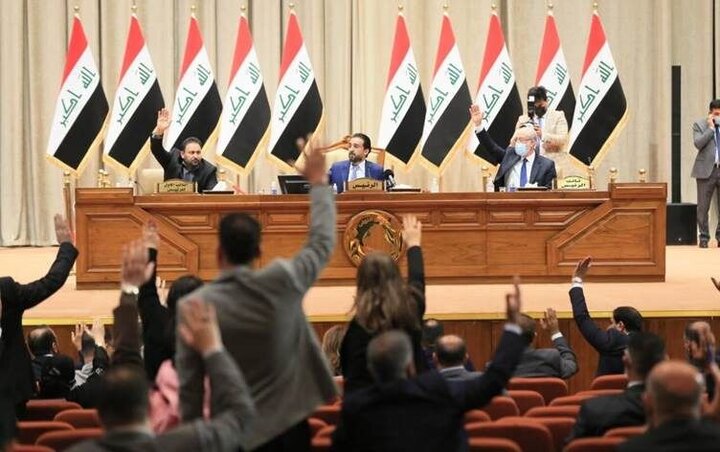Hassan Hanizadeh, in an interview with the site of the Strategic Council on Foreign Relations stated:” Although Moqtada Al-Sadr will not be able to introduce his proposed prime minister, but there is a possibility that Saairun trend form a coalition with the Progress coalition led by Mohammad Al-Halboussi, former Sunni Speaker of the parliament and Kurds’ coalition of Democrat Party and Patriotic Union of Kurdistan”.
He added:” The Progress trend won 37 seats and Kurds altogether won 61 seats in election. In order to get the ceiling of 165 seats, Saairun trend has to form a coalition with other parties and major trends”.
Having referred to the status of the State of Law led by Nouri Al-Maliki and Al-Fath coalition led by Shi’ite Haadi Al-Ameri, Hanizadeh said:” The said trends also managed to win 37 and 17 seats respectively. Therefore, even if Saairun coalition reaches an agreement with the two Shi’ite trends i.e. State of Law and Al-Fath, yet they need the participation of other coalitions”.
Having stated that early Iraqi parliamentary election which was the fifth since the fall of Baath regime in 2003, was accompanied with many conditions and IFs, the expert emphasized:” some of Shi’ite trends believe that Election High Commission, which apparently is an independent body, has managed and engineered the election with certain political objectives”.
On the victory of Al-Sadr, he also said:” the victory of Sadr trend is important from this point of view that regional and trans-regional powers can use the political instability of Sadr to attain their own objectives”.
Hanizadeh underscored:” Although Muqtada Al-Sadr opposes the presence of American forces in Iraq, but in the meantime, he strongly intends to disarm popular forces including Hashd-Al-Sha’abi, Al-Nojabaa, Asaeb Ahl-Al- Haq, and Hizbollah of Iraq. This very issue i.e. insistence on disarming popular forces has made the U.S., Saudi Arabia, UAE and Jordan happy and they “clap” for this clergy politician”.
On the efforts to way-out of the present situation, he also said:” During the past few days, leaders of Shi’ite trends known as “Beitol Shi’i” proposed a solution to Muqtada Al-Sadr to form a coalition with two trends of State of Law and Al-Fath, and reach to the ceiling of 165 seats through attracting other independent members of the parliament”.
According to Hanizadeh, Muqtada Al-Sadr called for Shi’ite trends in the course of the meetings which were held at the residence of Nouri Al-Maliki, leader of the State of Law in Baghdad to make a pledge that if Saairun trend form a coalition with them and to set up the future government, they should accompany him in disarming Hashd-Al-Sha’abi, Al-Nojabaa and Asaeb Ahl-Al Haq forces.
Having referred to the point that it is evident and State of Law and Aal-Fath coalitions are, under no circumstance, ready to accompany with Muqtada Al-Sadr to disarm these forces, he added:” therefore, bargains will keep going on among the leaders of Beitol Shi’i”.
Having stated that Muqtada Al-Sadr does not have necessary political stability, he explained:” that’s why one can not judge about his position takings in future, because he may change his minds and views at any moment”.
According to him, another pivotal issue in the centerpiece of discussions among the winners of Iraqi parliamentary election is to select a compromised prime minister. He continued:” in this regards, seven Shi’ite personalities have been nominated to lead the future government, but the winner trends of Iraqi parliamentary election have not concluded yet on a common candidate to become a compromised prime minister, who should be a Shi’ite according to the constitution of the country”.
He added:” Faegh Al-Zaiydan Chairman of the Supreme Justice Council, Ghassem Al-Earaji National Security Advisor, Mohammad Shia Al-Sudani one of the leaders of Hizbo-Da’ava, Jafar Sadr the present Iraqi ambassador to London and a cousin of Muqtada Al-Sadr, As’ad Al-Eidani influential Governor-General of Basra, Nissar Al-Rabi-ee one of the combatant politicians and a member of influential Bani Rabi’eh tribe of Iraq, and Mostafa Al-Kazimi the present Iraqi Prime Minister are candidates to assume the premiership post of the country”.
The Expert explained:” Naturally and based on the reason that the Prime Minister of Iraq has supreme authority in executive power, the U.S. and some Arab regimes surrounding Iraq have favorable views to a candidate who has a positive impression about them, Mostafa Al-Kazimi is a pioneer once he is compared with other candidates”.
He added:” the problem with Mostafa Al-Kazimi is that the Iraqi supreme religious authority who has the veto right to some extent, has explicitly declared that the new proposed prime minister should not have assumed the same post in the past, this can block the path for re-introduction of Nouri Al-Maliki and Mostafa Al-Kazimi”.
According to the expert on the Middle East, the combination of Iraqi parliamentary fractions and introduction of compromised prime minister to form the future cabinet depend on the final counselling of the winner trends of the election, particularly Shi’ite trends”.
Hanizadeh concluded to say:” due to instable political behavior of Muqtada Al-Sadr the leader of Saairun trend, it is not easy to achieve a common conclusion among the Parties to introduce a compromised prime minister, at least in short term”.










0 Comments